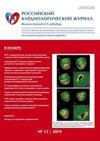口服抗凝剂与维生素 K 拮抗剂治疗 4-5 期慢性肾病患者的非瓣膜性心房颤动
Q3 Medicine
引用次数: 0
摘要
目的比较直接口服抗凝药(DOACs)与维生素K拮抗剂(VKA)对心房颤动(AF)和4、5期慢性肾脏病(CKD)患者的有效性和安全性。我们在 PubMed、Google Scholar 和 Web of Science 数据库中搜索了 1990 年至 2022 年期间在房颤和 4 期和 5 期慢性肾脏病患者中比较 DOAC 与 VKA 的研究。采用患者、干预、比较、结果(PICO)检索策略。数据由独立研究人员提取并进行荟萃分析。本次荟萃分析共纳入了 6 项研究。在有效性方面,DOACs与VKAs不相上下。在安全性方面,DOACs 和 VKAs 在出血性中风、轻微/消化道出血、总死亡率方面也没有统计学差异,但在大出血方面有统计学意义。结论就疗效和安全性而言,DOAC 与 VKAs 大致相当,但存在以下一些差异:与华法林相比,对 4 期和 5 期慢性肾脏病患者以及血液透析患者使用 DOAC 可显著减少大出血次数。本文章由计算机程序翻译,如有差异,请以英文原文为准。
Oral anticoagulants versus vitamin K antagonists in the treatment of non-valvular atrial fibrillation in patients with stage 4-5 chronic kidney disease
Aim. To compare the effectiveness and safety of direct oral anticoagulants (DOACs) with a vitamin K antagonist (VKA) in patients with atrial fibrillation (AF) and stage 4 and 5 chronic kidney disease (CKD).Material and methods. We searched in the PubMed, Google Scholar, and Web of Science databases from 1990 to 2022 for studies that compared DOACs with VKAs in patients with AF and stage 4 and 5 CKD. The patient, intervention, comparison, outcome (PICO) search strategy was used. Data were extracted by independent researchers and meta-analyzed.Results. A total of 6 studies were included in this meta-analysis. In terms of effectiveness, DOACs were comparable to VKAs. In terms of safety, DOACs and VKAs also had no statistical differences in hemorrhagic stroke, minor/gastrointestinal bleeding, overall mortality, but there was statistical significance in major bleeding. Conclusion. In terms of efficacy and safety, in general, DOACs were comparable to VKAs, but there were a number of following differences: the administration of DOACs to patients with stage 4 and 5 CKD, as well as those on hemodialysis, was accompanied by a significant reduction in the number of major bleedings, compared with warfarin therapy.
求助全文
通过发布文献求助,成功后即可免费获取论文全文。
去求助
来源期刊

Russian Journal of Cardiology
Medicine-Cardiology and Cardiovascular Medicine
CiteScore
2.20
自引率
0.00%
发文量
185
审稿时长
1 months
期刊介绍:
Russian Journal of Cardiology has been issued since 1996. The language of this publication is Russian, with tables of contents and abstracts of all articles presented in English as well. Editor-in-Chief: Prof. Eugene V.Shlyakhto, President of the Russian Society of Cardiology.
The aim of the journal is both scientific and practical, also with referring to organizing matters of the Society. The best of all cardiologic research in Russia is submitted to the Journal. Moreover, it contains useful tips and clinical examples for practicing cardiologists. Journal is peer-reviewed, with multi-stage editing. The editorial board is presented by the leading cardiologists from different cities of Russia.
 求助内容:
求助内容: 应助结果提醒方式:
应助结果提醒方式:


